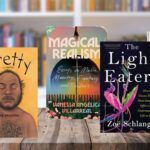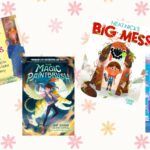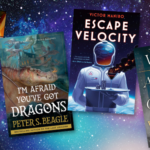
16 of the Best Books on Emotional Intelligence for the Mind and Body
Looking to learn more about your emotions? Read on for the best books on emotional intelligence.

What is emotional intelligence?
Emotional intelligence has recently become a big focus in work and our personal lives. The term gained popularity with the publication of Daniel Goldman’s book on the subject in 1995, but it is broad and can apply to many different aspects of bodily and mindful intelligence. Whether it is to find ourselves or to feel better in our bodies, emotional intelligence can allow us to see ourselves and the people in our lives more clearly and compassionately.
Instead of dividing the mind and body, emotional intelligence can also include the recognition of the physical space we take up in the world and making peace with that. From mindfulness, to inner peace, to body positivity, I hope this list of books on emotional intelligence gives you something you can latch onto to more happily take up your space in the world.
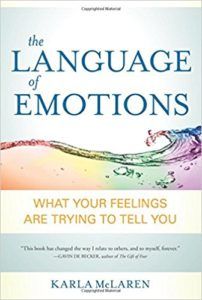 1. The Language of Emotions: What Your Feelings Are Trying to Tell You by Karla McLaren
1. The Language of Emotions: What Your Feelings Are Trying to Tell You by Karla McLaren
The most basic aspects of emotional intelligence are recognizing what emotion you’re feeling, naming it, and what that tells you about the situation. Karla McLaren’s book outlines these important recognitions beautifully and accessibly. Appealing for us to treat our emotions with respect and curiosity, she doesn’t shy away from the tougher and darker emotions. She also includes advice for empaths, and overcoming trauma and addiction. A great primer for all things emotionally intelligent.
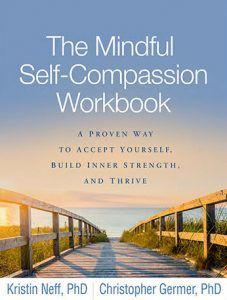 2. The Mindful Self-Compassion Workbook: A Proven Way to Accept Yourself, Build Inner Strength, and Thrive by Christopher Germer and Kristin Neff
2. The Mindful Self-Compassion Workbook: A Proven Way to Accept Yourself, Build Inner Strength, and Thrive by Christopher Germer and Kristin Neff
Through this compassionate and empathetic workbook, psychologists Kristin Neff and Christopher Germer outline the ways in which we all beat ourselves down. Mindful self-compassion is a practice of building emotional intelligence to recognize when we treat ourselves poorly. Sprinkled with meditation, affirmations, and soothing touch exercises, this book gives you the space to talk to yourself as you would a dear friend.
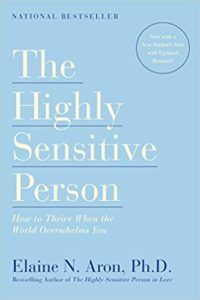 3. The Highly Sensitive Person by Elaine N. Aron
3. The Highly Sensitive Person by Elaine N. Aron
For Aron, “sensitive” is a broad term, meaning we can be sensitive to a variety of outside stimuli. A highly sensitive person might become exhausted easily from other people’s moods, being observed by people, and the general loudness of the world. This kind of exhaustion is not specific to introverted or extroverted people—everyone can get buried in the noise of the world. Aron’s series of HSP books and workbooks help us build the emotional wherewithal to recognize our sensitivity and nurture ourselves through it.
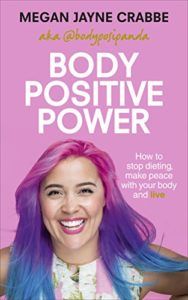 4. Body Positive Power by Megan Jayne Crabbe
4. Body Positive Power by Megan Jayne Crabbe
Megan Jayne Crabbe uses the space afforded to her by this book to expand on her arguments against the diet industry and how it forces us to ignore our own bodily and emotional knowledge in pursuit of an ever-smaller body. Like Crabbe, those of us who have struggled with eating disorders may have lost the ability to be kind to ourselves. Part of emotional intelligence is learning to be kind to our bodies. Life does not begin when we reach the smallest size—life is happening now and our bodies deserve our compassion.
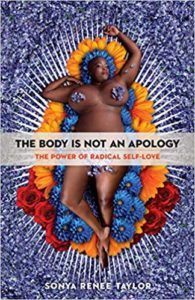 5. The Body is Not an Apology by Sonya Renee Taylor
5. The Body is Not an Apology by Sonya Renee Taylor
Sonya Renee Taylor’s mission with the Body Is Not An Apology movement and this book is about creating “global, radical, unapologetic self love which translates to radical human love and action in service toward a more just, equitable and compassionate world.” By radically embracing all bodies, we can be more compassionate and emotionally literate with others.
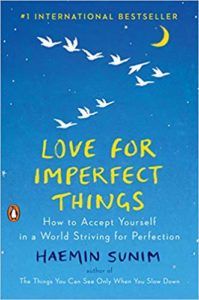 6. Love for Imperfect Things: How to Accept Yourself in a World Striving for Perfection by Haemin Sunim (illustrated by Lisk Feng and translated by Deborah Smith)
6. Love for Imperfect Things: How to Accept Yourself in a World Striving for Perfection by Haemin Sunim (illustrated by Lisk Feng and translated by Deborah Smith)
Haemin Sunim is a Zen Buddhist writer, and in this book he continues his gentle encouragement for all of us to find inner peace. Through making peace with ourselves and knowing what we cannot change, he believes there will be more space for love, wisdom, and compassion. There isn’t necessarily an end goal to inner peace—it is the practice of utilizing emotional intelligence to recognize where we are and accepting it.
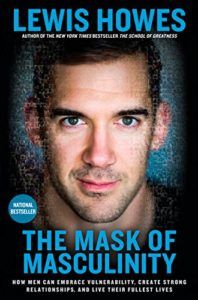 7. The Mask of Masculinity: How Men Can Embrace Vulnerability, Create Strong Relationships and Live Their Fullest Lives by Lewis Howes
7. The Mask of Masculinity: How Men Can Embrace Vulnerability, Create Strong Relationships and Live Their Fullest Lives by Lewis Howes
At the age of 30, Lewis Howes was succeeding, but empty. Instead of crumbling and turning inward, he consulted the experts about why men can feel so unfulfilled while filling the roles society expects of them. This book is an exploration of how men can build emotional intelligence and compassion to live better, not just louder.
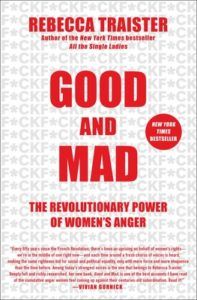 8. Good and Mad: The Revolutionary Power of Women’s Anger by Rebecca Traister
8. Good and Mad: The Revolutionary Power of Women’s Anger by Rebecca Traister
Emotional intelligence is as much about knowing when to let yourself get angry as it is about inner peace. Rebecca Traister uses this book to trace the history of women’s anger in progressive social movements and coalition building. The way in which women of all races, classes, and sexualities came together for political causes was not without argument and compromise. In addition to the anger and arguing, women used this space as one of compassion and understanding. Building communal emotional intelligence, through anger and trust that there is space for that anger, is necessary for any major social change.
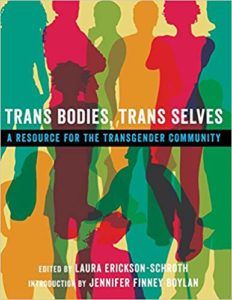 9. Trans Bodies, Trans Selves: A Resource for the Transgender Community by Laura Erickson-Schroth
9. Trans Bodies, Trans Selves: A Resource for the Transgender Community by Laura Erickson-Schroth
There is no singular transgender experience, full stop. Laura Erickson-Schroth’s edited volume brings together a myriad of voices to reaffirm that all trans experiences are personal and cannot but shoved under one umbrella. Part of emotional intelligence is educating yourself about how stereotypes work and why they do not hold water.
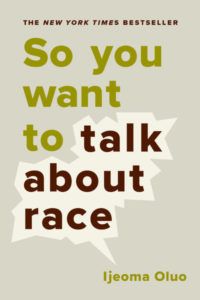 10. So You Want to Talk about Race by Ijeoma Oluo
10. So You Want to Talk about Race by Ijeoma Oluo
Ijeoma Oluo strikes the balance between compassionate storytelling and straightforward facts so perfectly, it’s hard to believe this book isn’t required reading for everyone in the United States. After she lays out the complex and dire situation of race and privilege in the U.S., she educates her readers on what is to be done and how we can have less screaming misunderstandings and more deliberate, emotionally intelligent and factually grounded conversations.
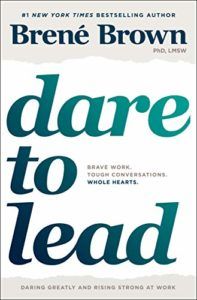 11. Dare to Lead: Brave Work. Tough Conversations. Whole Hearts. by Brené Brown
11. Dare to Lead: Brave Work. Tough Conversations. Whole Hearts. by Brené Brown
Since I first heard of Brené Brown, I feel as if she has been following me everywhere I go. Her ideas about compassion and self-knowledge come up all the time. Her most recent book, Dare to Lead, somewhat provocatively declares that leaders must recognize potential in people and actively work to nurture that potential into kinetic action. Instead of leading singularly, Brown implores us to call people in and foster human connection for a better society.
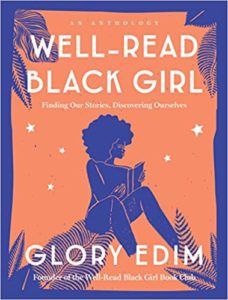 12. Well-Read Black Girl: Finding Our Stories, Discovering Ourselves by Glory Edim
12. Well-Read Black Girl: Finding Our Stories, Discovering Ourselves by Glory Edim
Glory Edim’s anthology of black women who love to read illustrates beautifully how we can make such strong connections with literature. All the writers in this book argue convincingly how important it is to see yourself in media, especially in book characters. Reading is a practice of emotional intelligence, and the strong affinities that a lot of us have for fictional characters is proof of that.
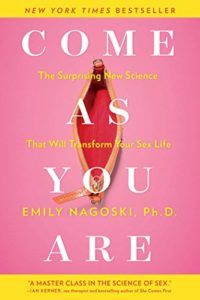 13. Come as You Are: The Surprising New Science that Will Transform Your Sex Life by Emily Nagoski
13. Come as You Are: The Surprising New Science that Will Transform Your Sex Life by Emily Nagoski
Equally important to the mind and the body is the pursuit of pleasure. Emily Nagoski’s bestseller breaks down the ways in which women’s sexuality has been marginalized, and the research about how we can access more fulfilling sexual lives. With research pulled from many disciplines, Nagoski shows that sex is an emotional as well as a physical act, with the context of everyday life popping in and enhancing (or muddying) the experience. It is necessary to nurture emotional intelligence to understand our sexual needs.
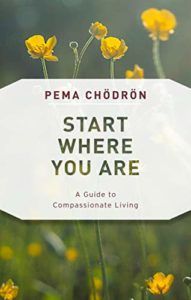 14. Start Where You Are: A Guide to Compassionate Living by Pema Chödrön
14. Start Where You Are: A Guide to Compassionate Living by Pema Chödrön
A classic of mindfulness, Pema Chödrön is a must-read for anyone trying to cultivate emotional intelligence. Instead of telling us a million things we need to fix in order to achieve mindfulness, Chödrön argues that we are exactly where we need to be. A must-read for any mindful and emotionally intelligent practitioner.
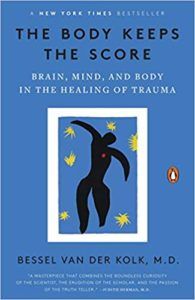 15. The Body Keeps the Score: Brain, Mind, and Body in the Healing of Trauma by Bessel van der Kolk M.D.
15. The Body Keeps the Score: Brain, Mind, and Body in the Healing of Trauma by Bessel van der Kolk M.D.
Trauma can migrate around the body and mind without us knowing. Bessel van der Kolk goes over the science of how trauma affects the brain and the body’s ability to process things as they happen. Far from a fatalist, he helpfully offers many different treatment options—from sports, to yoga, to acting. This book is an affirmation that we can’t just “get over it,” and allows us to heal and work on emotional intelligence with a variety of strategies.
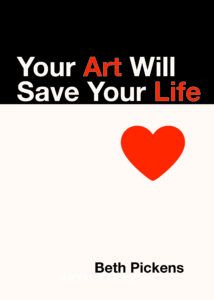 16. Your Art Will Save Your Life by Beth Pickens
16. Your Art Will Save Your Life by Beth Pickens
Beth Pickens is the rare consultant who supports artists in their career and gives them consistently amazing advice on how to achieve their artistic dreams. In times of major political turmoil, she pushes for artists to have the emotional intelligence to know they must not give up their art in favor of something more “practical.” Art is life-saving for artists and consumers.
And there we have it! A cavalcade of emotionally intelligent writers. What kinds of books on emotional intelligence have helped you with emotional intelligence in the past? I’m always on the look out for more!






